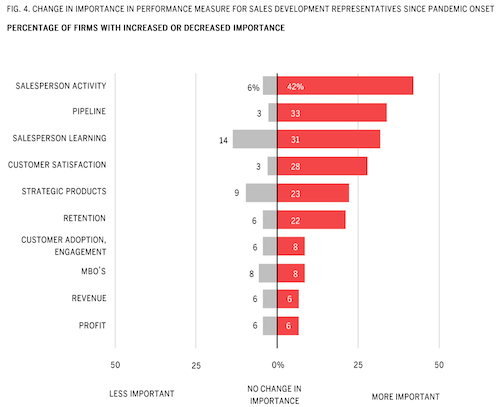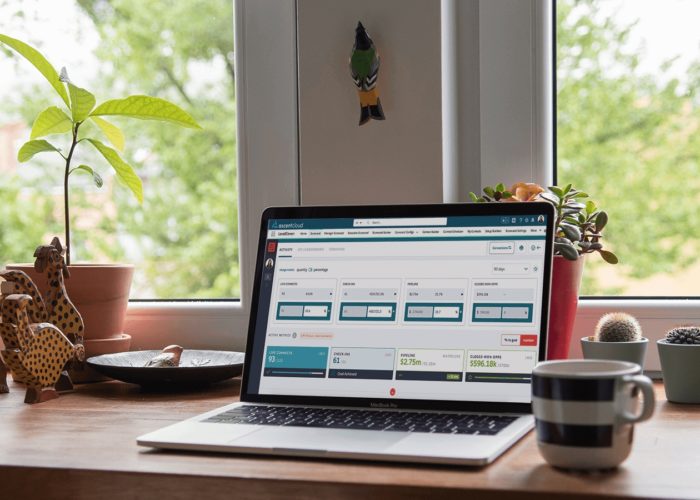Report Shows Learning Is a Metric Frequently Used by Sales Organizations to Track Performance
As we discussed in our previous blog, LevelEleven (through Ascent Cloud’s sponsorship) worked in tandem with the Sales Management Association to find out how sales teams are tracking performance and success, and how that has changed after COVID-19.
As providers of a Sales Performance Management solution, we were curious to know how the pandemic had impacted performance management for all job roles. In particular, we were deeply interested in the way teams were measuring performance and how that changed due to COVID-19.
With these questions in mind, we partnered with the like minded individuals at the Sales Management Association to survey a variety of sales organizations about their performance measurement practices. We asked sales teams to tell us what metrics they typically track to assess performance and incentive compensation, as well as the adjustments they made in response to the COVID-19 pandemic.
We wanted to know: how were traditional performance measurement metrics affected by the onset of COVID-19? What became more important, or saw an increase in emphasis, post-pandemic? Did any of the traditional metrics become less important as a result of the massive disruption in the way we sell?
Of the many findings from our report, one caught our attention: the significant increase in importance of “salesperson learning” as a measure of performance.
Salesperson Learning in Top 3 of Metrics With an Increase in Importance
According to our findings on the metrics used to evaluate performance, the importance of “salesperson learning” increased significantly across multiple job roles. For Sales Development Reps, learning increased over 30% in importance after the onset of COVID. According to the report,
“Since the pandemic’s onset, performance measures receiving the greatest increase in emphasis for SDRs are activities, pipeline metrics, and learning.”
For salespeople in Field Sales roles, “salesperson learning” increased in importance by 38%, falling second only to “salesperson activity.” As for those in an Inside Sales position, “salesperson learning” saw the single most increase in performance post-pandemic. Our survey found sales teams reported a 44% increase in emphasis on learning for Inside Sales roles.
This tracks with the theme we’ve seen recently in upskilling and reskilling – many people across all industries and roles are looking to learn new skills. Reskilling became necessary when companies were forced to reduce staff and employees had to alter existing roles to make up for the loss. Suddenly, people who had been performing the same tasks for years had to change focus and complete work that was new to them. The tasks that were formerly performed by their coworkers whose roles were cut fell on their shoulders because companies just didn’t have enough bandwidth.
Employees Have Drive to Learn New Skills
The increased focus on learning is present on both sides: while leaders have placed increased importance on employees’ learning, employees themselves are reporting an increased drive to learn and improve skills. In the wake of the pandemic, people have been more inclined to internal reflection on topics like their goals in life – one of which is learning new skills.
According to a Forbes article about widespread video content consumption, “Nearly two-thirds (65%) of people say they are re-evaluating their lives and their goals right now. And, as a result, they’re looking to…learn new skills. More than half of Google’s respondents (58%) reported that they are…[working] to learn new skills.”
In fact, across all video streaming services the top reason for consuming content was to learn new skills. 33% of respondents reported the desire to teach themselves new skills as the reason for their video usage. No matter what method is used for learning, the drive is present from both the employee side and the team leader side.
The Challenge of Tracking Salesperson Learning as a Metric
Despite the jump in emphasis, “salesperson learning” was one of the least effectively tracked metrics, with only 33% of respondents saying they felt confident they were effectively tracking it. This was one of the lowest levels of effectiveness we found among sales firms.
In fact, this statistic isn’t all that surprising: we know it can be hard to stay accountable or keep others accountable throughout the learning process. When there aren’t necessarily tangible or concrete outputs, visibility into progress becomes a challenge.
So what does this research tell us? That there’s an opportunity here for coaching solutions to improve how effectively sales organizations are tracking salesperson learning. LevelEleven’s solutions enable users to set up Success Plans* that can help hold employees accountable for improving or learning a new skill. A sort of template for creating a consistent coaching cadence, features such as preset questions and action items allow leaders to keep track of progress right in Salesforce without micromanaging. You can set goals for different milestones in the learning process, add action items as tasks in Salesforce, or schedule reminders to be sent to the employee’s inbox on a timeline set by you.
*If you are a LevelEleven customer who already has our Coaching solution, click here for step-by-step instructions on how to set up Success Plans for your team.
The Ability to Learn as an Essential Skill
The ability (and propensity) to learn is more important than ever. It may sound like a simple skill, but not everyone has it. Learning means adapting, seeking out new skill sets, and being willing to make the extra effort and always be improving. Those who do will see more success than those who are content with the status quo.
But how can you foster this growth in your employees as a sales leader? Here are a couple ideas to get you started:
- Host Lunch & Learns on relevant topics
- Set aside a budget for employee professional development
- Hold regular sales training sessions to share best practices
- Have top performers share their advice and techniques with the team
As for employees in sales roles similar to those we studied (SDRs, Field Sales Reps, Inside Sales Reps, etc.) who want to learn and increase their skills? The following is just a sample of the many ways you can take the initiative on your own to learn:
- Subscribe to industry-leading newsletters
- Follow top influencers in your field on social media
- Join online groups and communities centered around your industry (LinkedIn groups, Reddit subs, etc.)
- Register for webinars and look out for relevant conferences and seminars
- Participate in any Lunch & Learns hosted by your company
What importance do you place on learning in your sales team’s growth? Has your focus changed since the start of the pandemic? Let us know what metrics you’re tracking on social!
If you’d like to continue learning about the report’s findings, take a look at our next blog on how to structure your sales team correctly.




